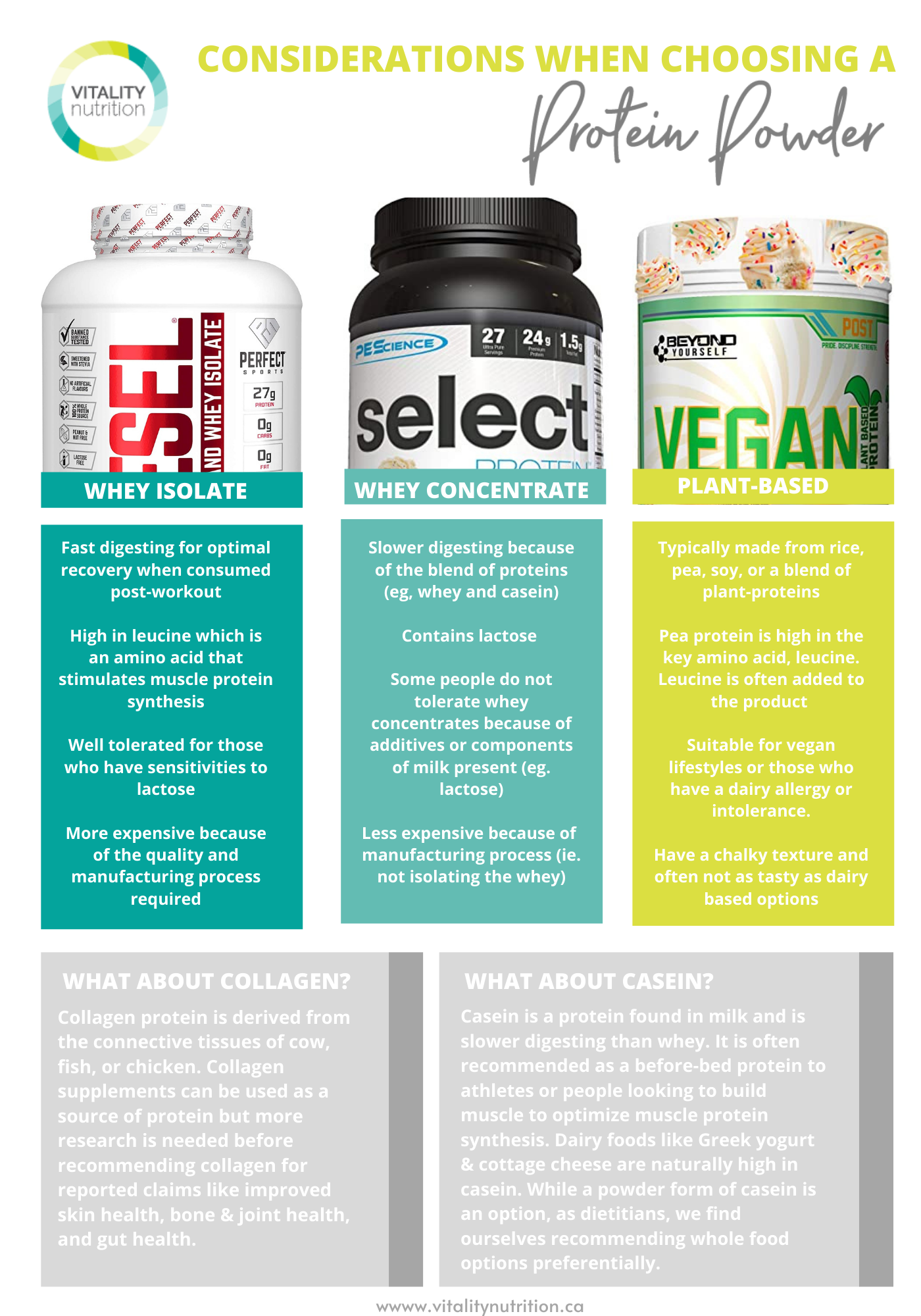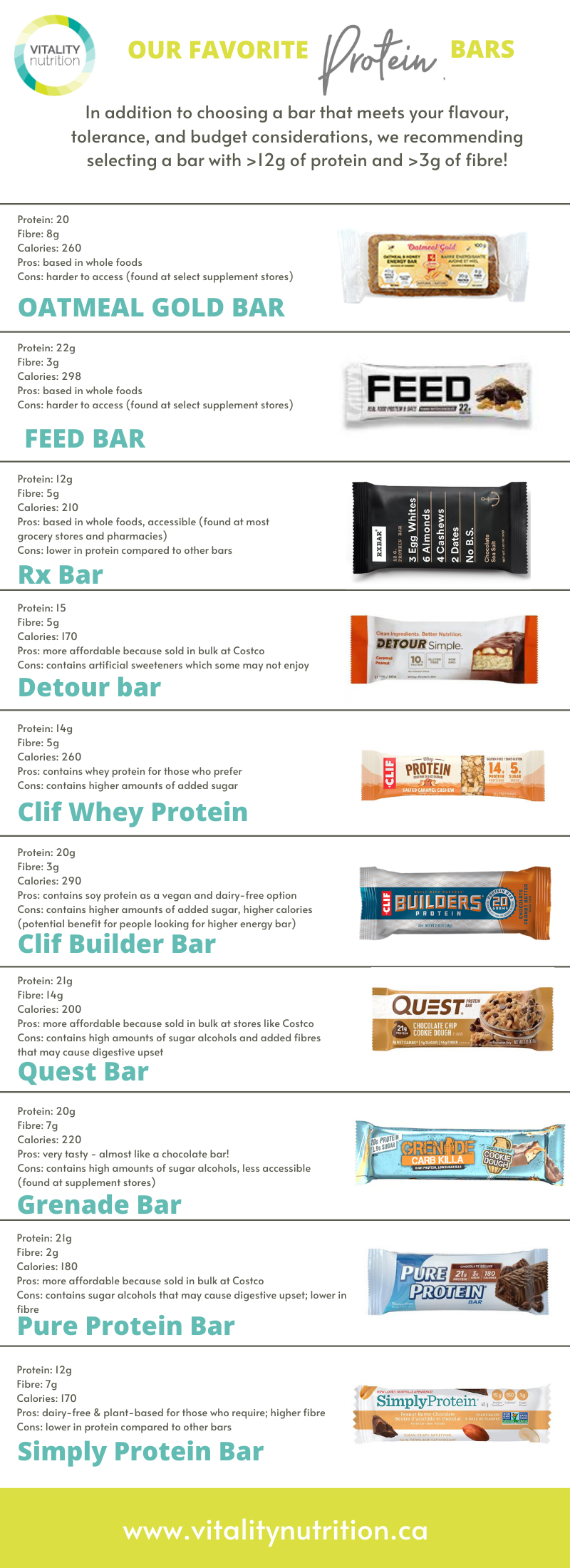How To Choose A Protein Powder or Bar │ A Registered Dietitian's Tips!
Jan 13, 2022
Overwhelmed when choosing a protein powder or bar? With a variety of protein powders and bars on the market, it can be a challenge to know what to look for. In this post, we share a general overview of what to consider when choosing a protein powder or bar!
**Disclaimer: It is important to consider that the supplements that will compliment your nutrition needs and personal goals will be unique to you. For this reason, we recommend consulting with a trusted healthcare provider before adding new supplements **
We discuss our recommendations for protein powder, protein bars, and other evidenced-based supplements on the Nutrition Unpeeled Podcast. You can find the link to the episode here!
DO I NEED TO USE PROTEIN POWDERS AND BARS?
Somewhat ironically, the dietitians at Vitality Nutrition consider reaching health and wellness goals like building an ice cream sundae with supplements being the cherry on top! We encourage you to consider protein powders and bars as a compliment to your lifestyle habits and a diet rich in minimally processed foods. While adequate protein can be obtained from whole food sources, protein powders and bars an be a tasty and convenient way to increase your protein intake. Athletes, frequent gym goers, people who are on-the-go, or anyone looking to reap the benefits of adequate protein intake may benefit from adding powders or bars as a convenient and tasty source of protein!

PROTEIN POWDERS
WHAT: Protein powders are concentrated sources of protein from animal or plant foods, such as dairy, eggs, rice or peas. While you can obtain adequate protein from food sources alone, some people benefit from the addition of protein powders to reach optimal levels.
BENEFITS: While the benefits of ingesting adequate protein are far reaching, three key benefits we find ourselves focusing on as Registered Dietitians include:
- Stabilizing blood sugars: protein causes a negligible increase to blood sugars and helps to delay the breakdown of carbohydrate from a meal. For this reason, including a source of protein can regulate blood sugars leading to long lasting, stable energy from a meal or snack.
- Supporting lean muscle mass: protein contains the amino acids require to build and maintain lean muscle mass.
- Feeling full for longer: protein increases the release of hormones that signal feelings of satisfaction to the brain.
For many, protein powders are a convenient source of protein to add to meals or snacks to achieve these benefits.
DOSE: While this is no set upper limit for protein powder, we find ourselves recommending no more than two servings per day of supplemental protein from powders or bars. Our rationale for the recommendation is to encourage clients to diversify their protein intake as different whole food protein sources offer different amino acids, vitamins, and minerals. Additionally, protein powders and bars are a more processed food source which may not keep you full for as long as a slower digesting, whole food alternative. For example, a serving of plain Greek yogurt will digest slower and likely keep you fuller for longer than a whey isolate protein powder.
WHO:
While a safely sourced protein powder is a sustainable option for anyone looking to increase their protein intake, there are certain cases where we find ourselves recommending protein powders:
- Athletes: While the type of sport will influence daily protein requirements, many athletes benefit from adding a protein powder as an additional protein source in their diet. Additionally, some athletes benefit from protein powder as a convenient post-workout recovery option.
- Strength-training: people who strength or resistance train have increased protein needs and may find benefit from using protein powder as one of their protein sources!
- Convenience: protein powders are a convenient protein source post-workout or for those who travel or have busy lifestyles. For example, some clients pack protein powder when travelling to support their protein intake when access to protein sources is limited.
- Taste: many of the protein powders on the market are tasty and can enhance the flavour of smoothies, protein pancakes, or plain Greek yogurt while adding an extra boost of protein to the meal.
- Weight gain: While protein powders do not cause weight gain when consumed in consideration of overall energy needs, they are a convenient source of calories for those looking to build muscle or gain weight. Certain protein powders have added carbs and fats which increase the calories in the product making it a convenient source of calories for those who have weight gain goals.
PRECAUTIONS:
Digestive Upset: A potential side effect of protein powders or bars is digestive distress which is often based on individual tolerance to dairy or lactose:
Dairy allergy or intolerance: dairy-based protein powders include whey isolate, whey concentrate, and casein. In this case, choose a plant-based or animal based protein powder (eg. Beyond Yourself or PEScience)
Lactose intolerance: whey isolate is a dairy-based protein that is low in lactose because the lactose sugar has been removed during processing. For this reason, those who have intolerances to lactose can often tolerate a high quality whey isolate protein powder (eg. Diesel whey isolate)
Banned substances: Nutrition supplements aren’t regulated by Health Canada the same as food products. If you want to ensure that your supplement actually contains everything it says it does on the label (and nothing else), you can look to see if your protein powder has been third-party tested.
Third party testing means that the protein powder (or other supplement) company has hired a third party organization to test and analyze the product to ensure it contains all of the ingredients in the amounts listed on the label. It also ensures that the product doesn’t contain any banned substances.
For athletes especially, it is crucial that the supplements they take do not test positive for banned substances. When it comes to making sure the supplement is safe and allowed for your sport, use the World Anti-doping Agency resources for ingredient checks. You could also check for banned substances through quality assurance programs such as Informed-Sport or Informed-Choice. These programs provide assurance that the batch tested came out clean.
CHOOSING A PROTEIN POWDER:
Unless you are an athlete sourcing a third-party tested product, one of the most important considerations when choosing a protein powder is they you enjoy the flavour and that the product fits within your budget. Review the infographic below for key considerations:

BOTTOM-LINE: While protein powders and bars aren’t necessary to meet your protein needs, they are convenient and tasty way to supplement your protein intake!
PROTEIN BARS
WHAT: Protein bars are a popular snack food designed to be a convenient source of nutrition. Similar to protein powders, the protein in bars is sourced from concentrated animal or plant food like dairy, eggs, peas, or soy.
BENEFITS:
The benefits of protein bars are similar to that of any protein-rich food as described above. As dietitians, we find ourselves recommending bars as a convenient way for clients to include protein in their snacks if they are busy, on-the-go, or simply looking for variety in their intake!
Furthermore, certain protein bars contain additional nutrients like carbohydrate, fats, and fibre. Fibre, in particular, is a nutrient that helps to regulate blood sugars, increase feelings of fullness and satisfaction, and support regular digestion. For this reason, many clients find benefit to including protein bars which offer both a convenient source of protein and fibre to meet their daily needs!
DOSE: Much like protein powders, we recommend that clients limit their intake of protein bars to no more than one per day if possible. This is to maintain variety in the diet to obtain key vitamins and minerals from whole, minimally processed foods!
That being said, there is no harm to consuming more than one protein bar per day in the context of being within your caloric and nutrient needs for the day! As dietitians, we’ve certainly found ourselves enjoying more than one protein bar on occasion whether it is a busy day, travel day, or simply because we chose to!
WHO:
- Energy support: a protein bar that is rich in protein and fibre is a convenient snack that will keep your blood sugars stable for optimal energy through your day.
- Athletes or Strength Training: protein bars offer a source of protein (ie. amino acid) to support recovery and the building and maintenance of lean muscle mass.
- Travel and Convenience: protein bars are convenient and portable option as an on-the-go or travel snack.
- Taste: many of the bars on the market are tasty and offer a satisfying source of protein and nutrients as a snack option through the day. A tasty protein bar may be an encouraging way to increase beneficial fibre and protein in your diet!
PRECAUTIONS:
Digestive distress: digestive upset can be caused be an intolerance to an ingredient in the bar (eg. milk protein). However, the most common reason for digestive upset from a protein bar is if the protein bar contains added fibre or sugar alcohols.
- Added fibres: added source of fibre may cause digestive upset including cramping, diarrhea, bloating, or constipation. This is because they either pull water into the digestive tract or slow the rate of digestion. Added fibres to watch for in the ingredient list include:
- inulin
- chicory root
- Isomalto-Oligosaccharides
- soluble corn fiber
- xanthan gum, and
- others.
Not everyone experiences intolerances to these fibres but they are ingredients to consider if you experience digestive distress from bars and would like to source a bar free of added fibres.
- Sugar alcohols: Sugar alcohols are added to bars to give them a sweet taste without the added calories or blood sugar increase that regular sugar offers. The downside to sugar alcohols is that some can cause gastrointestinal side effects when consumed in large amounts because the body cannot digest most of them. For this reason, they can ferment in the intestines and/or pull water into the intestines which leads to gas, bloating, or diarrhea. If you experience these consequences after consuming sugar alcohols, avoid bars with sugar alcohols by watching for ingredients ending in ‘ol’ including: erythritol, xylitol, mannitol, and sorbitol.
HOW TO CHOOSE A PROTEIN BAR:
Choosing a protein bar is similar to choosing a protein powder in that you will want to choose a bar that you enjoy, fits your budget, and contains ingredients that you tolerate and match your lifestyle. For example, if you do not tolerate dairy or follow a vegan lifestyle then you will want to source a bar that is dairy-free or plant-based.
Aside from sourcing ingredients that you tolerate, we have three key considerations for choosing a bar:
- Protein: we recommend choosing a bar with >12g of proten per bar. If you have higher protein requirements you may look to source a bar with closer to 20g of protein.
- Fibre: we recommend choosing a bar with >3g of fibre per bar. If you do not tolerated synthetic fibres, you may want to avoid bars with added fibre in the ingredients or bars with >8g of fibre per bar.
- Calories: we recommend choosing a bar with between 150-250 calories if your goal is weight loss or weight maintenance and a bar with >250 calories per bar if your goal is weight gain. This recommendation is made as a general consideration in the context of caloric needs based on these differing goals.
Review the graphic below for some of our favorite bars based on nutritional considerations as well as availability and flavour!

BOTTOM-LINE: While protein bars are not necessary to meet your nutritional needs, they are a convenient snack that offers a source of both protein and fibre to keep your blood sugars (ie, energy) stable.
CONCLUSION:
Adequate protein can be sourced from whole, minimally processed foods. Protein powders and bars, however, can be a convenient and tasty source of protein to reap the benefits of including protein at meals and snacks! When choosing a protein powder or bar, it is important to consider your taste preferences, budgets, and dietary tolerance to specific ingredients including the protein source itself or additives like fibre and sugar alcohols.
PS: for further dialogue on this topic, tune into our podcast on supplements here.
Ready to bring the evidence-based nutrition support of our Registered Dietitians into your kitchen?
Hungry for more?
Get recipes, tips, and updates from the Vitality Nutrition team straight to your inbox!
Don't worry, your information won't be shared.

